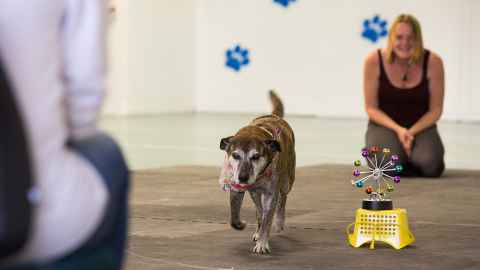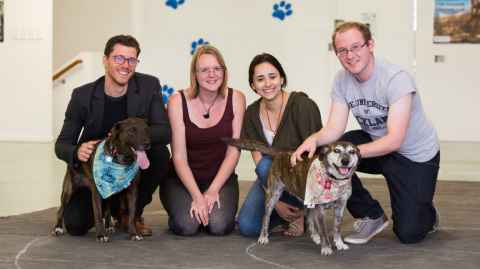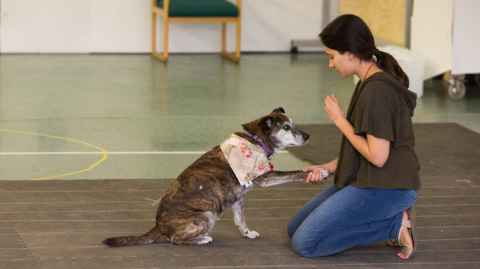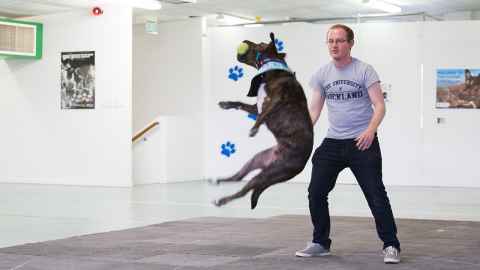How do dogs think? Clever canines and comparative psychology
5 December 2017
Evolutionary psychologist Dr Alex Taylor reckons he has one of the best jobs in the world. “I mean, who wouldn’t want to work with dogs all day?” he laughs.

The director of the School of Psychology’s recently established Clever Canine Lab has always been fascinated by animals, but it was during his undergraduate studies at the University of Oxford that Alex realised he could combine his love of animals with his interest in history and evolution.
“I read a paper by a Brazilian biologist who was observing butterflies in the field while running a complicated and intellectually challenging experiment on evolution and I thought, ‘That’s basically my dream job: to work on big questions in evolution, be mentally stimulated, and at the same time work with animals’,” he recalls.
A Brit hailing from Bolton in the north of England, Alex’s journey to Auckland begins in the basement of the Biology department at Oxford.
“One of the professors brought over some New Caledonian crows and housed them in the basement. Betty the crow had bent a piece of wire into a hook and I saw the talk where this research was first presented,” Alex remembers, “I was really interested in animal behaviour at the time and everyone was excited about it – Richard Dawkins was there, asking a million questions! – there was a real buzz around the research, and the species.”
But Alex didn’t want to study a smart species in a basement at Oxford. He wanted to work with the Auckland team who had been the first to discover complex tool use in the New Caledonian crows (Professor Russell Gray and Dr Gavin Hunt), so he took up a Commonwealth Scholarship to study for his PhD in Psychology at the University of Auckland.
A keen kiteboarder and surfer, Alex loves Auckland for its proximity to the ocean. “Here, I’m able to have an outdoors lifestyle while also doing cool science in an environment that feels really supportive,” he enthuses.
I’ve always wanted to work with dogs – what’s going through their brains has always been a big mystery to me.
While the New Caledonian crows have been Alex’s mainstay, he has also worked with everybody’s favourite alpine parrot, the cute ‘n’ curious kea. “Kea climb all over you, pulling your hair, grabbing your watch and camera. They are adorable, but they are a challenge! I feel really privileged to be working with them,” he says.
A step from crows to kea is logical, but a leap from birds to dogs? “I’ve always wanted to work with dogs – what’s going through their brains has always been a big mystery to me,” he explains, “and I also wanted to do research based in Auckland, to make it easier to involve undergraduate students.”
And so the Clever Canine Lab was born. Alex was honoured as a Rutherford Discovery Fellow in 2014 and, while his fellowship has supported the Lab, it has mostly been “a lot of hard work by my fantastic PhD students Patrick Neilands, Amalia Bastos and Rebecca Hassall, and my honours student Ivy Ren,” he says.
The Clever Canine Lab is exploring how dogs think, with a view to gaining a deeper understanding of the evolution of intelligence. The researchers play fun games with the dogs, and focus on the social bonds with their owners.
Compared to his work with birds, Alex’s dog research gives him the luxury to spend time refining his methodology. “We had 400 dog owners register within the first three weeks, so we can run much bigger studies with a greater number of subjects,” he explains, “and it is a lot less stressful than the crows and kea, where there are a limited number of subjects and a short field season.”

Alex says that when he’s trying to understand how an animal thinks, he starts with an evolutionary reason why a particular ability might have evolved. “We know that dogs have been co-evolving alongside us for a long time, so we think about what might have given dogs an advantage when interacting with humans.”
One of the most intriguing experiments is the ‘detour problem’ – that is, whether or not a dog judges an object as something to fear, by questioning why their owner might avoid it. The dogs in this study seem to treat the object as more threatening if they see their owner make a detour around it.
“It’s very early days and we still have more data to collect, but if this result continues it’ll suggest that dogs view humans as agents that make rational decisions about dangers to avoid,” says Alex.
These results also lead on to the ‘throwing experiment’, where dogs need to assess whether humans are competent at particular actions, such as throwing or kicking a ball: “It’s all part of a suite of computations about social agents, which is really underexplored in comparative psychology,” he explains.
Alex says that, while some of the results are influencing the direction of the experiments, plans often change and the team are flexible when they observe anecdotal results in their subjects. “I’ve become really interested in this idea of dog emotions, particularly secondary emotions such as jealousy and guilt.
“I hadn’t anticipated how engaged the dogs’ owners would be, so I thought it would be really fun to run experiments around things that they really care about – people want to know if their dog really gets jealous, or if it feels guilt, and this area hasn’t had a lot of attention so far in the scientific community.”
I hadn't anticipated how engaged the dogs' owners would be... People want to know if their dog really gets jealous, or if it feels guilt, and this area hasn't had a lot of attention so far in the scientific community.
From his work with birds Alex learnt the importance of science communication – that is, engaging people with science that’s easy to relate to and generates enthusiasm.
He believes there is value in finding out how dogs think and communicating this to the public. “We’re reminded of the connections we have with our pets – and to nature – and it’s great to give people a way to understand how socially sensitive their animals are,” Alex explains.
The team are also talking to assistance dog groups about how their research can be applied in those settings, with potential to affect the way guide dogs and mobility dogs are trained. “Right now we’re asking dogs to make fairly simple assessments of human competence, but if we give them the right experiences then maybe they can start making more sophisticated inferences about the agents around them – it could help speed up training, take training further, or even train breeds for specific purposes.”
The team work with a variety of breeds at the lab and although remaining diplomatic, Alex says that others in this field have told him that Border Collies are where it’s at – “I’ve been joking about making it just a Border Collie lab!” he laughs. “But really, the types of tasks that a Border Collie has to do [when herding stock] require more independent thought than other breeds. It has to make judgements every second, and be able to predict what a sheep might do next, for example. I think there’s good reason to expect them to be slightly better than other breeds at a lot of tasks requiring social intelligence.”

While he has collaborated with colleagues on previous projects, Alex says the Clever Canine Lab is a chance to flex his independent research muscles: “As a young researcher, once you’ve shown that you can do good research with others, you have to show that you can do good research on your own. The Lab gives me the opportunity to do just that.
“Having said that, we are planning work with Dr Ian Kirk, and others in the School of Psychology, to use EEG headbands to record the dogs’ brain activity while they’re doing some of our experiments,” he says.
In the future, Alex foresees the owners being more involved in the studies, by giving them homework training tasks to work on with their pets. “We want to involve the community and the owners as much as possible. Getting owners to train their dogs before a study is a great way to do that while also running some really exciting science,” he enthuses.
The Clever Canine Lab team are passionate about the future of their field, in terms of the impact and application of their research. “Humans have run a grand, unplanned experiment on dogs since they’ve been domesticated – we’ve selected them for various attributes, and there have been lots of other traits that have come in along the way,” says Alex, “Over the next 30 years or so we’ll begin to see the results of that experiment – it’s really exciting.”

Find out more
inSCight
This article appeared in the December 2017 edition of inSCight, the print magazine for Faculty of Science alumni.